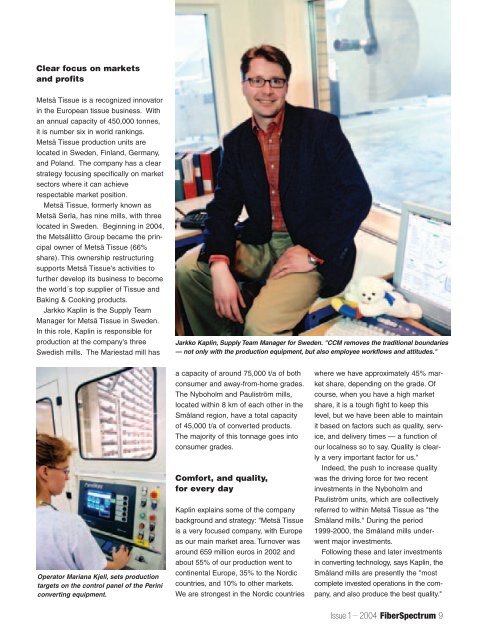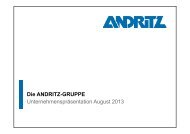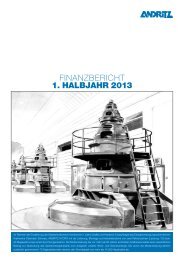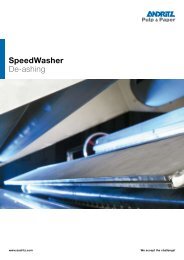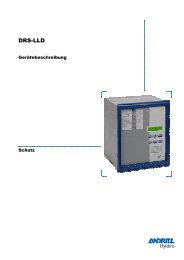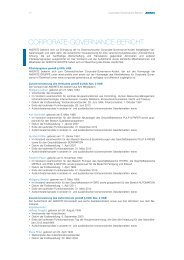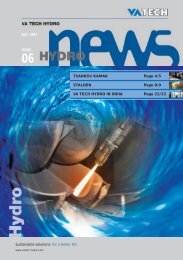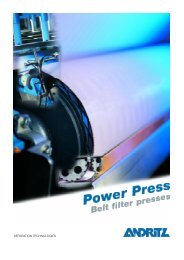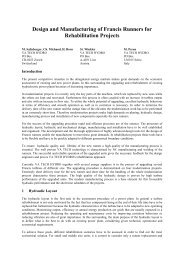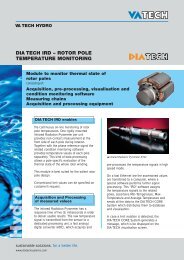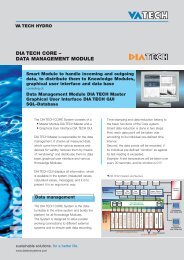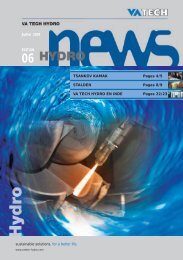The customer magazine of Andritz Pulp & Paper Issue 1— 2004
The customer magazine of Andritz Pulp & Paper Issue 1— 2004
The customer magazine of Andritz Pulp & Paper Issue 1— 2004
You also want an ePaper? Increase the reach of your titles
YUMPU automatically turns print PDFs into web optimized ePapers that Google loves.
Clear focus on markets<br />
and pr<strong>of</strong>its<br />
Metsä Tissue is a recognized innovator<br />
in the European tissue business. With<br />
an annual capacity <strong>of</strong> 450,000 tonnes,<br />
it is number six in world rankings.<br />
Metsä Tissue production units are<br />
located in Sweden, Finland, Germany,<br />
and Poland. <strong>The</strong> company has a clear<br />
strategy focusing specifically on market<br />
sectors where it can achieve<br />
respectable market position.<br />
Metsä Tissue, formerly known as<br />
Metsä Serla, has nine mills, with three<br />
located in Sweden. Beginning in <strong>2004</strong>,<br />
the Metsäliitto Group became the principal<br />
owner <strong>of</strong> Metsä Tissue (66%<br />
share). This ownership restructuring<br />
supports Metsä Tissue's activities to<br />
further develop its business to become<br />
the world´s top supplier <strong>of</strong> Tissue and<br />
Baking & Cooking products.<br />
Jarkko Kaplin is the Supply Team<br />
Manager for Metsä Tissue in Sweden.<br />
In this role, Kaplin is responsible for<br />
production at the company's three<br />
Swedish mills. <strong>The</strong> Mariestad mill has<br />
Operator Mariana Kjell, sets production<br />
targets on the control panel <strong>of</strong> the Perini<br />
converting equipment.<br />
Jarkko Kaplin, Supply Team Manager for Sweden. "CCM removes the traditional boundaries<br />
— not only with the production equipment, but also employee workflows and attitudes."<br />
a capacity <strong>of</strong> around 75,000 t/a <strong>of</strong> both<br />
consumer and away-from-home grades.<br />
<strong>The</strong> Nyboholm and Pauliström mills,<br />
located within 8 km <strong>of</strong> each other in the<br />
Småland region, have a total capacity<br />
<strong>of</strong> 45,000 t/a <strong>of</strong> converted products.<br />
<strong>The</strong> majority <strong>of</strong> this tonnage goes into<br />
consumer grades.<br />
Comfort, and quality,<br />
for every day<br />
Kaplin explains some <strong>of</strong> the company<br />
background and strategy: "Metsä Tissue<br />
is a very focused company, with Europe<br />
as our main market area. Turnover was<br />
around 659 million euros in 2002 and<br />
about 55% <strong>of</strong> our production went to<br />
continental Europe, 35% to the Nordic<br />
countries, and 10% to other markets.<br />
We are strongest in the Nordic countries<br />
where we have approximately 45% market<br />
share, depending on the grade. Of<br />
course, when you have a high market<br />
share, it is a tough fight to keep this<br />
level, but we have been able to maintain<br />
it based on factors such as quality, service,<br />
and delivery times — a function <strong>of</strong><br />
our localness so to say. Quality is clearly<br />
a very important factor for us."<br />
Indeed, the push to increase quality<br />
was the driving force for two recent<br />
investments in the Nyboholm and<br />
Pauliström units, which are collectively<br />
referred to within Metsä Tissue as "the<br />
Småland mills." During the period<br />
1999-2000, the Småland mills underwent<br />
major investments.<br />
Following these and later investments<br />
in converting technology, says Kaplin, the<br />
Småland mills are presently the "most<br />
complete invested operations in the company,<br />
and also produce the best quality."<br />
<strong>Issue</strong> 1 — <strong>2004</strong> FiberSpectrum 9


